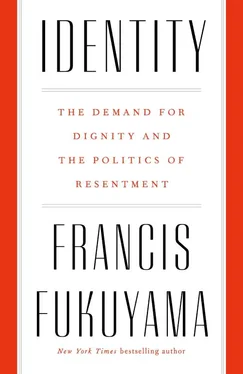The same evolution occurred within the feminist movement, only more quickly and powerfully. The demands of the mainstream movement were focused, like the early civil rights movement, on equal treatment for women in employment, education, the courts, and so on. But from the beginning an important strand of feminist thought argued that the consciousness and life experiences of women were fundamentally different from those of men, and that the movement’s aim should not simply be to facilitate women’s behaving and thinking like men. Simone de Beauvoir’s highly influential 1949 book, The Second Sex , asserted that women’s experience of life and their bodies was heavily shaped by the patriarchal nature of the society around them, and that this experience could be scarcely perceived by men. {3} 3 Simone de Beauvoir, The Second Sex (New York: Alfred A. Knopf, 1953).
This view was expressed in a more extreme form by feminist legal scholar Catharine MacKinnon, who argued that rape and intercourse were “difficult to distinguish,” and that existing laws on rape reflected the rapist’s point of view. While not all of the writers of such laws were rapists, she said, “they are a member of the group who do [rape] and who do for reasons that they share in common even with those who don’t, namely masculinity and their identification with masculine norms.” {4} 4 Stuart Jeffries, “Are Women Human?” (interview with Catharine MacKinnon), Guardian , April 12, 2006.
The idea that each group has its own identity that was not accessible to outsiders was reflected in the use of the term lived experience , which has seen explosive growth in the popular culture since the 1970s. {5} 5 See Jacob Hoerger, “Lived Experience vs. Experience,” Medium , October 24, 2016, https://medium.com/@jacobhoerger/lived-experience-vs-experience-2e467b6c2229 .
The distinction between experience and lived experience has its roots in the difference between the German words Erfahrung and Erlebnis , which preoccupied a number of thinkers in the nineteenth century. Erfahrung referred to experiences that could be shared, as when people witnessed chemistry experiments in different laboratories. Erlebnis (which incorporates the word Leben , or “life”), by contrast, meant the subjective perception of experiences, which might not necessarily be shareable. The writer Walter Benjamin argued in a 1939 essay that modern life constituted a series of “shock experiences” that prevented individuals from seeing their lives as a whole and made it hard to convert Erlebnis into Erfahrung . He saw this negatively as a “new kind of barbarism” in which communal memory breaks down into a series of individual experiences. {6} 6 These points are all made in Hoerger, ibid.
This line of thought ultimately traces back, we should recall, to Jean-Jacques Rousseau, whose emphasis on the “sentiment of existence” valorized subjective inner feeling over the shared norms and understandings of the surrounding society.
The distinction between Erfahrung and Erlebnis is the same as the distinction between experience and lived experience . The latter term entered the English language via Simone de Beauvoir: the second volume of The Second Sex was entitled L’expérience vécue , or “lived experience.” The lived experience of women was not the lived experience of men, she argued. Women’s subjective experiences raised the profile of subjectivity as such, which was applied to other groups and categories: those based on race, ethnicity, gender orientation, disability, and the like. Within each of these categories, lived experiences were different: those of gays and lesbians differ from those of transgender people; a black man in Baltimore has a different experience from a black woman in Birmingham, Alabama.
The new prominence of lived experience reflects the broader nature of long-term modernization, one we noted earlier that gave rise to the problem of identity in the first place. Modernization entails the emergence of a complex society with an elaborate division of labor, the personal mobility that necessarily underlies modern market economies, and the movement from village to city that creates a diverse pluralism of individuals living next to one another. In contemporary societies, these social changes were deepened by modern communications technology and social media, which allow like-minded individuals in geographically separate places to communicate with one another. In such a world, lived experiences, and therefore identities, begin to proliferate exponentially, just like YouTube stars and Facebook circles on the internet. What erodes just as rapidly is the possibility of old-fashioned “experience,” that is, perspectives and feelings that can be shared across group boundaries.
The therapeutic turn that institutions such as schools, universities, health centers, and other social services had taken meant that they were ready to minister to people’s psyches—the isothymia driving each social movement—as well as to their material conditions. As the growing consciousness of racial minorities and women became stronger in the seventies and eighties, a vocabulary and framework were ready-made for understanding their experiences of marginalization. Identity, which had formerly been a matter for individuals, now became the property of groups that were seen as having their own cultures shaped by their own lived experiences.
Multiculturalism was a description of societies that were de facto diverse. But it also became the label for a political program that sought to value each separate culture and each lived experience equally, and in particular those that had been invisible or undervalued in the past. While classical liberalism sought to protect the autonomy of equal individuals, the new ideology of multiculturalism promoted equal respect for cultures, even if those cultures abridged the autonomy of the individuals who participated in them.
Multiculturalism was originally used in reference to large cultural groups such as Canadian francophones or Muslim immigrants or African-Americans. But these groups fragmented further into smaller and more specific groups with distinct experiences, as well as groups defined by the intersection of different forms of discrimination, such as women of color, whose lives could not be understood through the lens of either race or gender alone. {7} 7 Kimberlé Williams Crenshaw, “Mapping the Margins: Intersectionality, Identity Politics, and Violence Against Women of Color,” Stanford Law Review 43:1241–99, July 1991.
Another factor driving the shift of focus to identity was the increasing difficulty of crafting policies that would bring about large-scale socioeconomic change. By the 1970s and ’80s, progressive groups were facing an existential crisis throughout the developed world. The hard left had been defined for the first half of the century by Marxism and the Marxist emphasis on the working class and the proletarian revolution. The social democratic left, which unlike the Marxists accepted liberal democracy as a framework, had a different agenda: it sought to expand the welfare state to cover more people with more social protections. In both its Marxist and its social democratic variants, the left hoped to increase socioeconomic equality through the use of state power, both to open access to social services to all citizens and to redistribute wealth and income.
The limits of this strategy were evident as the century drew to a close. The Marxist left had to confront the fact that actual Communist societies in the Soviet Union and China had turned into grotesque and oppressive dictatorships, denounced by leaders such as Nikita Khrushchev and Mikhail Gorbachev, who were themselves Communists. Meanwhile the working class in most industrialized democracies grew richer and began to merge happily with the middle class. Communist revolution and the abolition of private property fell off the agenda.
Читать дальше












